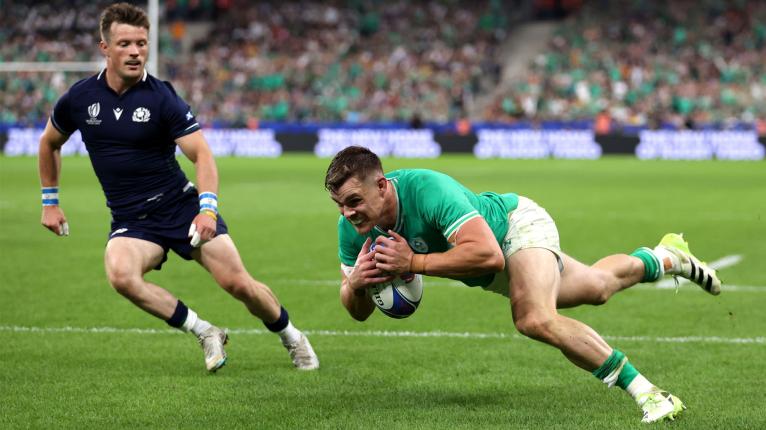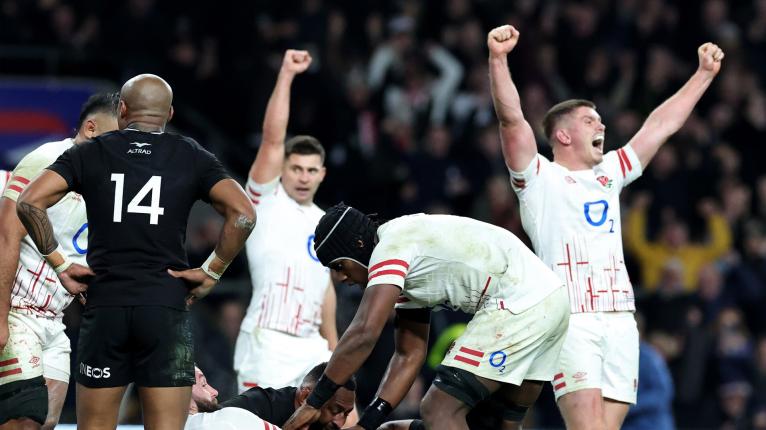The stage is set for what just might be the two most hotly anticipated Rugby World Cup quarter-finals of all time in Paris next weekend.
If France and Ireland, the two champions of Pools A and B at the 2023 Rugby World Cup, can continue their rich veins of form and best their more decorated opposition at the Stade de France, it will be hard to imagine a situation where the William Webb Ellis Cup doesn’t break new frontiers at the end of October.
As the All Blacks in particular have learned over the past 35 years, it’s not always the most consistent or impressive team over the four-year World Cup cycle that eventually heads home with the fabled trophy.
New Zealand entered the 1987, 1999, 2007, 2011, 2015 and 2019 tournaments as odds-on favourites (and were there or thereabouts in 1991 too) after largely dominating the international scene in the periods preceding each of those competitions. Three World Cup titles is not exactly a poor return for the men in black – most nations would trade in their rugby souls for that kind of success – but it is a poor reflection of their dominance of the game over the past three and a half decades. It also shows that consistency over the four years leading up to the showpiece event is far less important than consistency over the two months leading up to the grand final.
Of course, the two most dominant sides throughout the current international cycle have been France and Ireland, and they understandably entered the tournament with the shortest odds to claim victory.

A run of 11 undefeated games – coupled with the fact that everyone seems largely uncomfortable with not backing New Zealand for World Cup glory – saw the All Blacks pick up a few believers throughout the current year’s campaign but those expectations were quickly quelled when South Africa and France had no issues demolishing NZ in successive matches over the past six weeks.
Of course, the level of the opposition throughout that 11-game period without loss was largely ignored. The likes of Australia and Australia – who contributed six of the 10 victories during that stint – have been underwhelming at the World Cup, to say the least, and they weren’t in much better form over the past 12 months. Add Japan and perhaps the worst Wales team of the modern era to the list (although Wales have certainly turned things around since Warren Gatland was brought back into the fold at the beginning of the year), and the writing was probably on the wall heading into August’s clash with South Africa at Twickenham.
In the four weeks since their loss at the hands of the tournament hosts, the All Blacks have posted big scores against three rugby minnows, Namibia, Uruguay and a dangerously overrated Italy side (who, for all the talent they have coming through the ranks, have failed to take the tier-one scalps of any nations bar the hugely underperforming Wales and Australia) and any expectations of a miracle against Ireland in Paris should be quickly nipped in the bud.
Can the All Blacks beat their more fancied opposition at the Stade de France? Absolutely. But it’s going to require the best performance New Zealand have put on the park perhaps since Ian Foster took over as head coach in 2020 – and likely also rely on Ireland falling off the wagon for what would be the first time in an impressively long stint.
Ireland have been consistently strong from match to match since Andy Farrell came on board, but they’ve also played consistent games within matches. They rarely take their foot of the pedal, even for brief moments, and that’s made them impossibly difficult for opposition sides to crack.
Ireland simply don’t switch off – and that’s a worrying proposition for a side like the All Blacks, who have rarely put together 80-minute performances with Foster at the helm.
In Paris on Saturday night, Scotland were regularly able to string successive phases together and make some useful yardage up the park but it rarely resulted in points. Ireland’s discipline remained intact and they always seemed to have the perfect numbers in place to ensure they never overcommitted on defence, but also never found themselves outflanked by the expansive Scottish backs.
Scotland put together 18 phases at one stage inside Ireland’s 22 in the first 20 minutes, forcing Ireland to make almost 50 tackles, but come the end of the period it was the Scotland players who looked far more out of breath than their opposites in green.
Moments later, Ireland had the ball down the other end of the park and Mack Hansen would’ve been diving in for a try if Peter O’Mahony had been able to release the ball even one tenth a second earlier than he did. The lost opportunity didn’t matter in the end, of course, with Ireland banking a more than comfortable 36-14 win.
Ireland simply don’t switch off – and that’s a worrying proposition for a side like the All Blacks, who have rarely put together 80-minute performances with Foster at the helm. That was especially evident last year, when NZ ceded 15, 14 and 10-point leads against South Africa, Scotland and Australia respectively. While the All Blacks were eventually able to claim victories in each each of those games, they saved their worst for last when they gave up a 19-point lead with nine minutes to play against England in their final game of the season, succumbing to a 25-all draw.
Meanwhile, slow starts against Ireland (down 15-3) and South Africa (down 19-3) ensured they were always chasing those games and were never able to put their opposition under pressure.
If the All Blacks don’t come out of the blocks firing or switch off at any stage next Saturday – two issues that have been endemic in their game over the past two or three years – they can kiss their chances of a fourth World Cup title good-bye.

Like the All Blacks, the Springboks have received a surge of support thanks, in part, to a bemusing (but not necessarily unexpected) belief that Jacques Nienaber simply must be hiding something up his sleeves following a five-point loss to Ireland earlier in the month.
South Africa, like their rivals in NZ, have been made to look incredibly good at times over the past 18 months thanks to the strength (or lack thereof) of their opposition. Yes, the Springboks have, at various points in recent memory, thrashed the All Blacks, Wallabies, Wales and Italy – but they’ve come away empty-handed against the two World Cup favourites, dropping all three games they played against their Ireland and France since 2019.
Like the All Blacks, the Springboks could spring a surprise against a potentially Antoine Dupont-less France side in Paris on Sunday – but the safe money is on the World Cup hosts.
While the same level of consistency hasn’t necessarily been there from Les Bleus when compared with the world number ones, they have played some of the most enthralling and expansive rugby of the past four years. Against Italy on Friday night they looked incredibly well-drilled and with men like Peato Mauvaka, Gregory Alldritt, Damian Penaud in scintillating form, even the Springboks will struggle to get a foothold.
Where France could fall down is their lack of big-game Test experience. Despite having all the talent in the world, Fabien Galthie’s men have only taken home one piece of silverware in the past four years, the 2021 Six Nations. With the vast majority of their players in their mid-20s, however, they’re sure to be an even better side in four years’ time.
New Zealand and South Africa have well and truly dealt to every side they’ve been favoured ahead of in their pool matches throughout the 2023 World Cup but when push comes to shove, will they be able to conquer their more fancied opposition in what will be cauldron-like atmospheres at the Stade de France next weekend?
The All Blacks and Springboks might have the pedigree but with Ireland and France in truly wonderful form over the medium and short term, the writing appears to be on the wall for the Southern Hemisphere nations. Come Sunday morning in an ever-cooling Paris, the chances of a new World Cup holder taking the crown this year could well have skyrocketed.



Comments
Join free and tell us what you really think!
Sign up for free